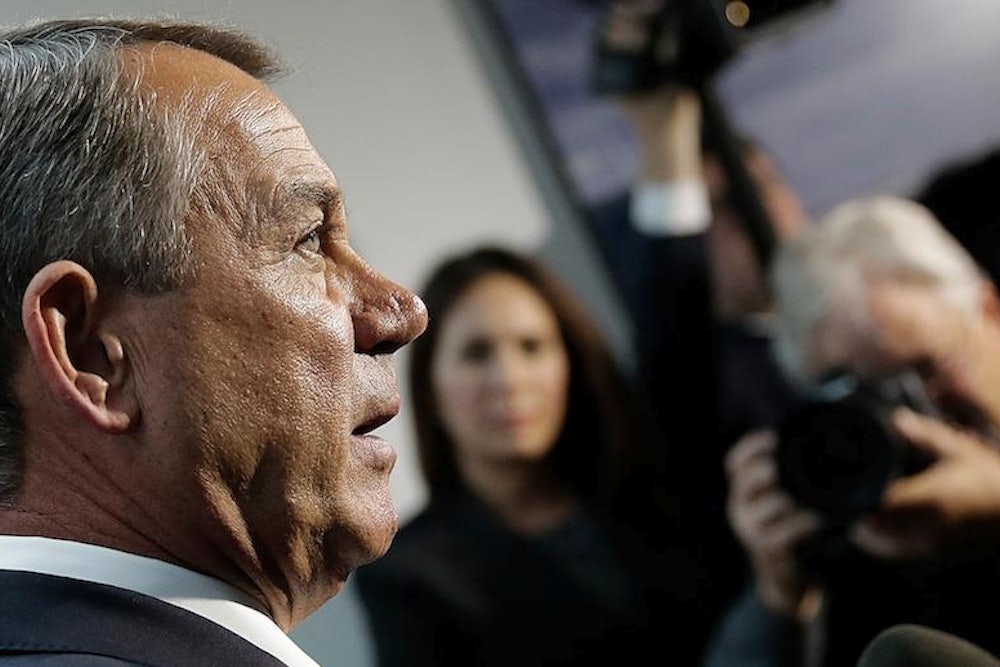It looks like the Republican extortion campaign of 2013 is about to end, not with a bang but with a whimper. And the whimper is going to come from the Speaker’s office.
John Boehner spent Tuesday trying, one last time, to rally his caucus behind a proposal that would force Democrats to give up something in exchange for funding the government and avoiding default. But, with President Obama refusing to negotiate under such circumstances, and with pollsters detecting rising outrage with Republicans, Boehner was no longer asking for much. He’d given up seeking big changes to the president's health care law, which was the original purpose of the shutdown, and he’d dropped the idea of getting major cuts to spending and entitlements. Instead, Boehner and his allies had decided to resurrect the “Vitter amendment,” a measure that would have effectively cut the pay of congressional staffers by taking away their employer contribution for health insurance.
As it turned out, nobody was too interested. Conservative Republicans liked the Vitter amendment, but they weren’t going to support a bill that didn’t have a more substantial impact on Obamacare. Democrats, for their part, weren’t going to lend votes for a bill that was so obviously mean-spirited and unnecessary. (TNR’s Alec MacGilllis has the backstory if you want it.) By afternoon, it was clear the bill couldn’t pass. Boehner cancelled the vote and, soon enough, aides began conceding the obvious to reporters: The House was done. Politico’s Jake Sherman got an email from a Republican aide: “Time to roll over.”
And that’s where things stand as of Tuesday evening. Senate leaders Harry Reid and Mitch McConnell are meeting again, finalizing the deal they started negotiating over the weekend. Their bill will fund the government through January, raise the debt ceiling enough to last through February, and set up new bipartisan discussions on the budget. It will include what looks like a cosmetic Obamacare adjustment: Requiring the Secretary of Health and Human Services to certify that the new insurance marketplaces could verify the incomes of applicants. But it will not change the program in any fundamental way.
The mechanics of moving this legislation through Congress are not entirely clear, at least to me. But the basic idea is for the Senate to pass the bill, with strong bipartisan support. With so many Republicans behind it, and with the Treasury Department about to exhaust the “extraordinary measures” it’s been using to pay bills, Boehner will in theory call a vote—and allow the bill to pass with substantial Democratic support.
Maybe things won’t work out as planned. Maybe Boehner will decide, on Wednesday morning, to try one more scheme. Who knows. But if Boehner eventually allows a vote on something like the Senate compromise—which is what most insiders now expect and, yes, what Noam predicted the other day—Republicans will walk away with very little to show for their efforts. The Affordable Care Act will remain law of the land, with full funding and no new delays. Spending on entitlements and discretionary spending will remain what they were, subject to routine negotiation. Only Republican political standing will have changed—for the worse.
But the Republicans won’t be the only losers. You will be, too. Treasury running out of money to pay its bills would have dire economic consequences. But the mere possibility has already taken a toll, for reasons Felix Salmon explained at his Reuters blog:
The US government, in one form or another, is a counterparty to every single financial player in the world. Its payments have to be certain, or else the whole house of cards risks collapsing — starting with the multi-trillion-dollar interest-rate derivatives market, and moving rapidly from there.
And here’s the problem: we’re already well past the point at which that certainty has been called into question. Fidelity, for instance, has no US debt coming due in October or early November, and neither does Reich & Tang. …
While debt default is undoubtedly the worst of all possible worlds, then, the bonkers level of Washington dysfunction on display right now is nearly as bad. Every day that goes past is a day where trust and faith in the US government is evaporating — and once it has evaporated, it will never return. The Republicans in the House have already managed to inflict significant, lasting damage to the US and the global economy
Macroeconomic Advisers agrees: As Paul Krugman noted on Tuesday, the firm released a new assessment suggesting that the fiscal instability of recent years, along with austerity policies, bumped up the unemployment rate by more than one percentage point.
It’s easy to blame this all on Ted Cruz, Tea Party Republicans, and groups like Heritage Action that supported them. But give these conservatives their due: Many of them really believe that nutty stuff about Obamacare and Obama. It’s the less extreme Republicans, the ones who know better, who allowed this to happen, because they never stood up to the far right wing. And one reason they stayed silent is nobody stood up to lead them.
That somebody should have been Boehner. He’s the Speaker, after all. He may not command the power of his predecessors, who were able to parcel out earmark spending projects. He may have an unusually petulant and impractical caucus on his hands. But he still has some power to push back—to challenge his critics, to rally his own supporters, and to appeal to the public at large. Standing up to his party's right wing would have meant risking ouster, but sometimes that's what leaders do—they take controversial stands and dare their followers to undermine them. Boehner didn't do that. Instead, he accommodated the Tea Party and waited until the very last minute before defying them, in the hopes they would understand he had no choice.
The gambit will probably work for Boehner, just as it has before: He'll get to keep his job. But the rest of the country is paying a price.
